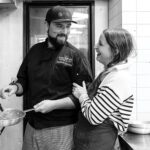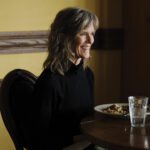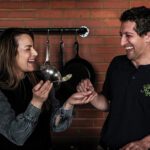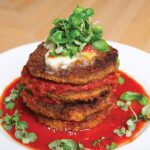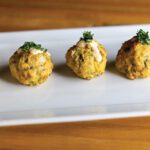All rise
February 1, 2021
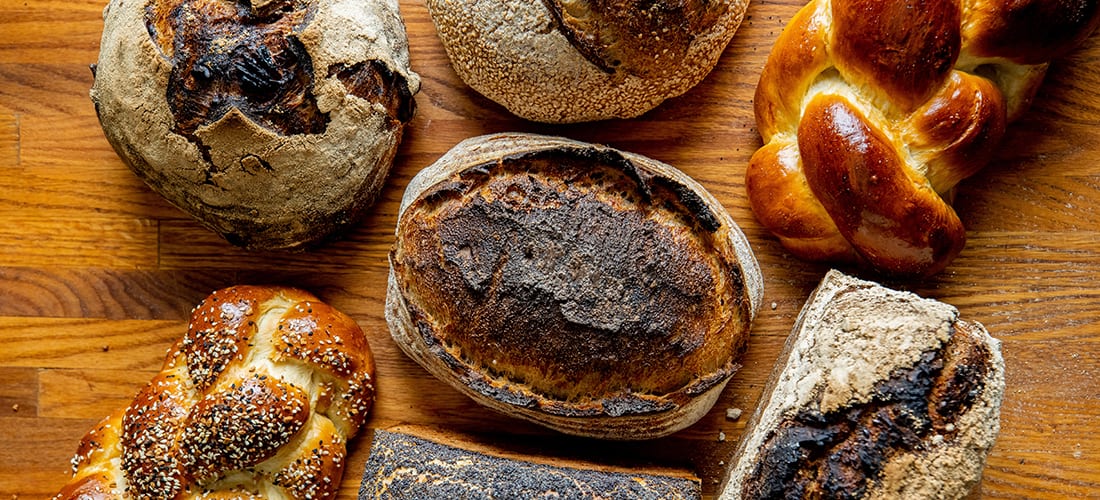
The Charlotte couple behind Team Rose Bread bakes core values into naturally leavened, artisan loaves.
by Michael J. Solender • photographs by Peter Taylor
A few blocks behind a busy stretch of Sharon Road, a midcentury modern ranch surrounded by century-old pin oaks sits on an oversized lot, one of only two homes framing the stubby cul-de-sac. Out front, the gnarled arm of a sprawling oak anchors a long rope swing that holds the promise of swooping, semicircular rides for the home’s youngest inhabitants and their tiny pals. Bicycles, scooters and other stray toys lay scattered across an otherwise well-manicured lawn.
Since September, on each Tuesday and Friday afternoon, a steady flow of neighbors, friends of friends and cheery strangers amble down the long driveway, their visits dually rewarded by engaging conversation with homeowners Douglas and Kaitlin Rose and a takeaway purchase of fresh-baked, artisanal whole-grain breads.
The unique loaves are so flavorful that internationally recognized bread guru Peter Reinhart, author of the James Beard Award-winning The Bread Baker’s Apprentice, deems the Roses’ sourdough country loaf — 25% whole grain with sprouted wheat and rye — “among the best sourdough bread in the city.” In just a few short months, the self-taught bakers have divined a nearly magical alchemist’s hand for the notoriously finicky and unforgiving craft.
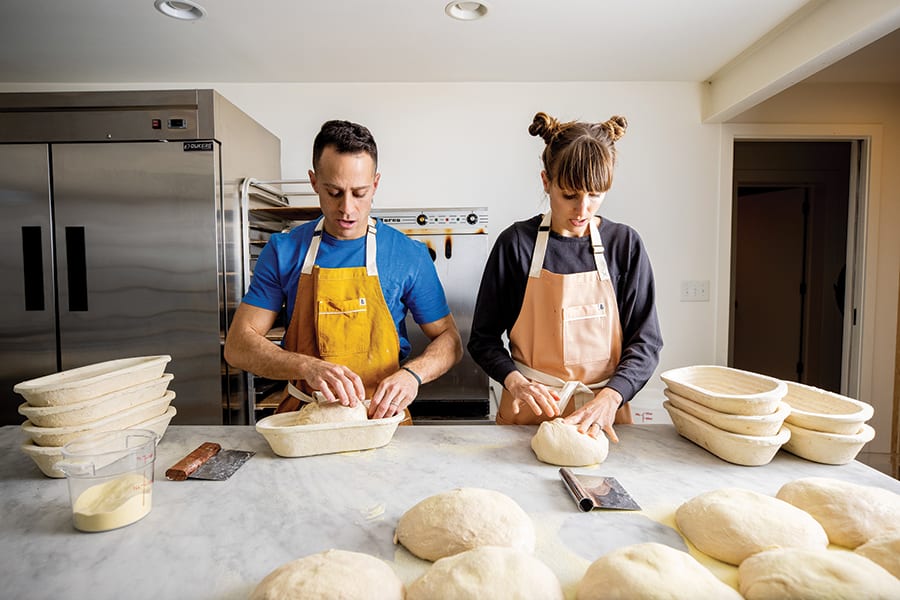
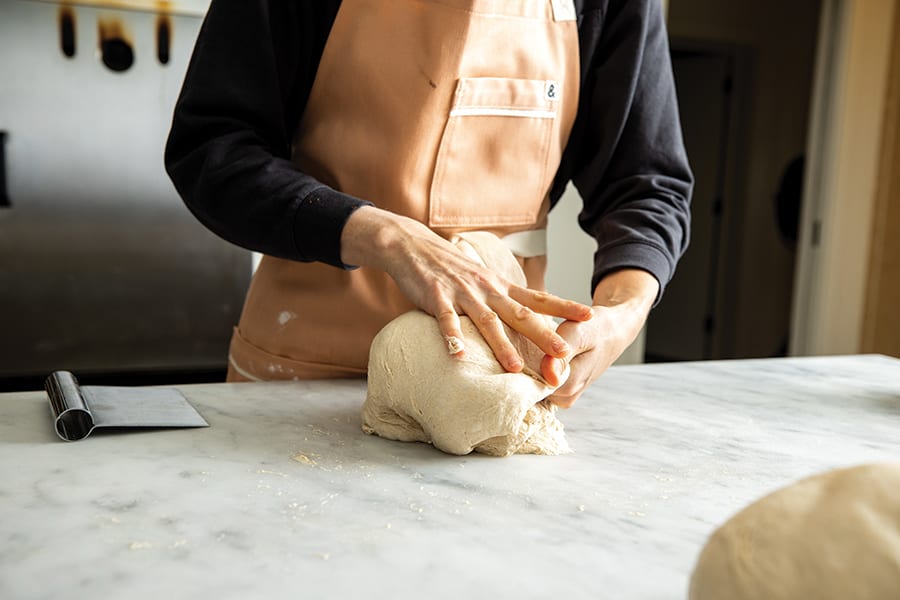
An ancient tradition
Each week, the couple turns out nearly 250 crusty loaves from their tiny bread shop. Last summer, with the help of a friend, the Roses reconfigured a 450-square-foot carport in the home where they’ve lived since 2011 into a working bake kitchen. They market the bread, which sells for $8 to $16 a loaf, exclusively through Instagram (@teamrosebread) and word of mouth. Twice a month, the family of six sells loaves at Matthews Community Farmers’ Market, and, occasionally, they host Saturday pop-up events where they sell specialty baked goods — cinnamon rolls, sticky buns and vegan doughnuts are among their recent offerings.
Challah, Struan, Abruzzi rye, spelt and sourdough bagels are just a few of the internally developed recipes that emerge from Team Rose Bread’s diminutive 12-loaf capacity oven. Eschewing most commercial baking techniques, the Roses lean heavily on traditional processes and ingredients such as ancient grains, used over generations by bakers across the globe. All their breads are naturally leavened — here, the use of commercial yeast is frowned upon.At any given time, the couple has three or more versions of levain, a natural leavening starter made with flour, water and wild yeast, growing under refrigeration.
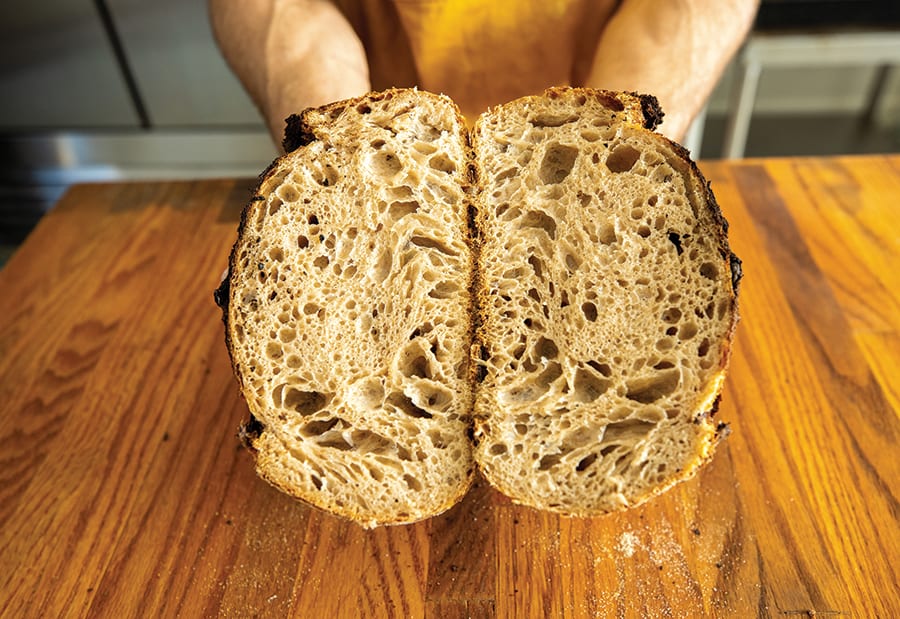
“The pull for us toward the avenue of bread is simple,” says Douglas, 38. “The connection to ancient grains, and the story of what bread used to be and what it should be — a life-sustaining, nourishing form of food — offers a sense of rootedness and connection.”
Connection is a cornerstone value for the Roses, who met when they were college students — Douglas at Davidson College and Kaitlin at Duke University, where she played lacrosse. The concept of rootedness helped drive the decision to create a home-based business, placing their young family at the center of a journey that’s just beginning to unfold.
Like many young couples with small children, the 30-somethings became increasingly introspective during Covid’s earliest days and looked to capitalize on extra time at home, more deeply enjoy the closeness of their children, and fulfill a longtime dream of working together. Douglas, an entrepreneur who grew up in New York City, was winding down an online men’s accessories and luxury-goods business, while Kaitlin, a Maryland native, was homeschooling their four children.
Last spring’s Covid lockdown accelerated their decision to take the plunge and start Team Rose Bread. It is a business in which they can collaborate, involve the children, serve the community, and nourish their love for learning, all while preparing natural and healthy food for themselves and their neighbors.
“We’ve always dreamed of doing some sort of business together,” says Kaitlin, 36. “Before the pandemic I’d been baking sourdough bread for several years with a dear friend of mine. We were baking six or so loaves at a time, and eventually I started selling a loaf here and a loaf there to friends. The seed for a business was planted probably a year or so before we made the decision to do this full time. We began construction on the bread shop on June 27, our anniversary.”
Family affair
While the couple held some concerns regarding the venture, its economic viability and a shifting family dynamic, the excitement surrounding the experience of learning a traditional trade, developing community relationships and engaging the entire family aligned in a way that felt right.
“For us, we just have a desire and want to be a formative influence for [our kids],” Douglas says. “Our youngest is 4 and our oldest is 11. We see this as a great opportunity to be around our kids as much as possible and be fully present.”
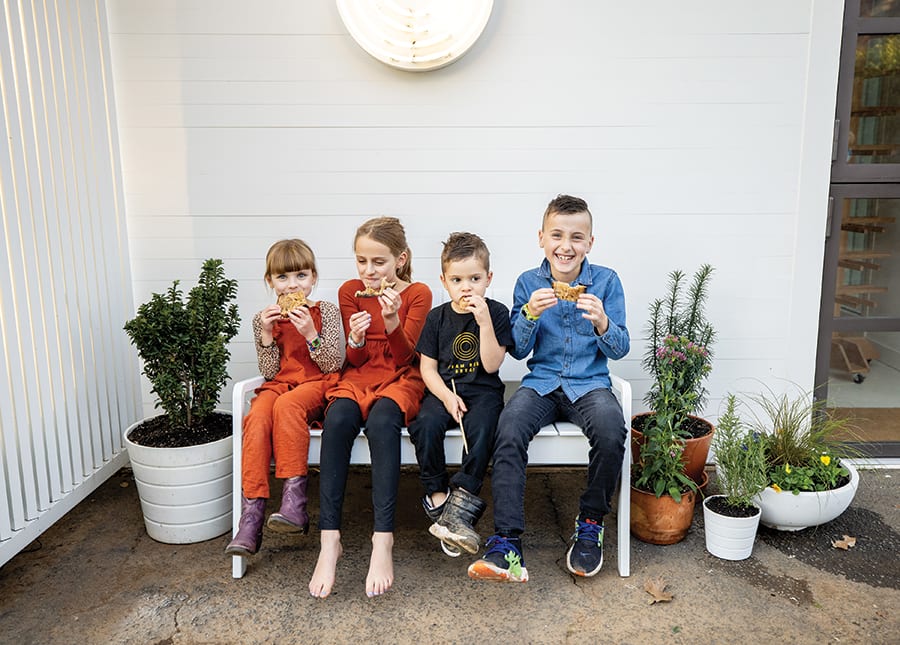
A visit to their bread shop — the couple avoids the term “bakery” as they don’t focus on pastries — typically finds each of the children actively contributing to the operation. Four-year-old Robinson loves to run the vacuum cleaner, tracking down stray crumbs. Six-year-old Samantha shows off her artistic side in elegantly braiding loaves of challah. Noa, 11, likes placing Team Rose Bread stickers neatly on each loaf bag, and Benzion, 8, is a “fulfillment” maven manning the Dutch door, greeting customers with their orders and making change.
“Our view as a couple shapes every decision we make in life,” Kaitlin says. “Doug and I have just gotten to a place [of] evaluating what is important to us. I like him being here, and we love working together. The timing just made sense.”
Though Kaitlin had experience as a home-based bread enthusiast, it’s Douglas’ zeal for bread history, culture and technique that fuels the “bread-lab” aspect and daily quest for knowledge of the craft. Early in the journey, Douglas heard Reinhart, a baking instructor at Johnson & Wales University, speaking about artisan bread on a radio show and reached out directly to invite him to dinner and “pick his brain.”
“He politely turned me down,” Douglas says. “I think he gets many requests for his time and is understandably cautious.” Undeterred, Douglas went back to Reinhart with an offer he couldn’t refuse: He’d noted Reinhart’s social-media accounts could benefit from updating and offered help in exchange for baking advice. The friendship bloomed.

Deep study
“Small-scale garage and cottage bakeries represent an increasing national trend in the artisan-bread arena,” Reinhart says. “Douglas and Kait approach the craft embracing tradition and heritage in ways that come through in the flavor and quality of their bread.”
As an homage to Reinhart, the couple developed “Peter’s Struan,” a sturdy harvest bread that is one of Reinhart’s favorites, based on one of his classic recipes. The multigrain loaf incorporates cooked rice, polenta, oats and honey and is well-suited for toasting and sandwiches.
Research led Douglas to reach out to heavyweights across the national artisan-bread community. Connecting with regional grain expert, miller and foodways historian Glenn Roberts, founder of South Carolina’s Anson Mills, has proven particularly beneficial. The grower and miller of organic heirloom grains serves as a primary flour source and recipe inspiration for Team Rose.
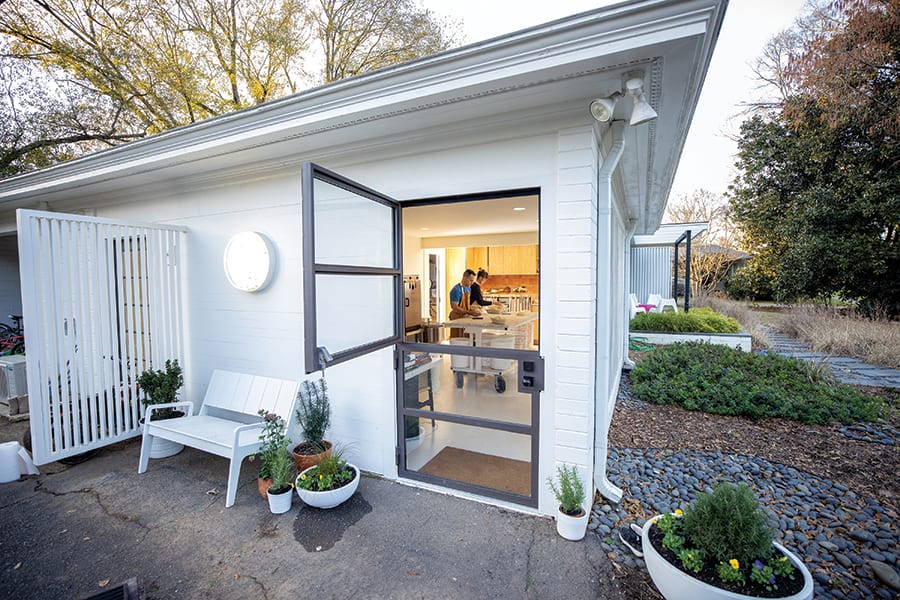
“The best talent is usually driven by an artistic motive,” says Roberts, who has visited Team Rose’s at-home bake shop. “Doug and Kait are more interested in creating art first, profit second and taking care of their consumers somewhere in that mix, too. What drives them is the creative urge [of baking] as an artist endeavor. It’s the art of flavor that has meaning for them. Flavor equals nutrition — and that’s important to them.”
Through visits with Roberts at Anson Mills, the Roses developed a deeper understanding of characteristics such as “terroir,” or environmental factors of the soil and conditions where the grain is grown and under which it is milled. After learning about the virtues of a rare Scots Bere barley from Roberts, Team Rose created a toasted oat porridge Scots Bere chocolate sourdough. The vegan loaves were a hit with a lucky few taste testers and now appear on Team Rose Bread’s rotating lineup.
For the Roses, the personal relationships developed over the last few months have been as important and rewarding as creating flavorful and nutritional bread.
“People just show up,” Kaitlin says. “They find us somehow, but I love that aspect. It’s a face-to-face exchange we enjoy. People — especially right now — they want to see others and have human interaction with someone outside of their home.”
Scale and capacity are never far from the Roses’ thoughts, as expansion beyond their home bread shop is not in the plans.
“We want to have sustainable income and provide for the family,” Douglas says. “But we don’t want to be baking every day and delivering bread to a commercial retailer where we don’t interact with our customer. It’s just not our plan.” Purchasing a larger oven to produce loaves more efficiently is in the plans, however, and the Roses also see an opportunity with UrbanPromise Charlotte. The local nonprofit provides spiritual, academic and social development for youth through camps and after-school programs. The Roses donate 10 loaves weekly to the organization.
For the Roses, baking bread has just begun to open a world of possibilities. SP
